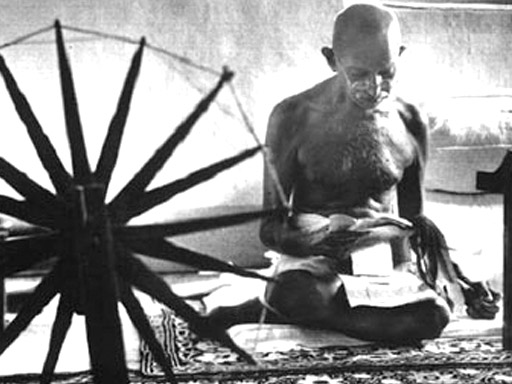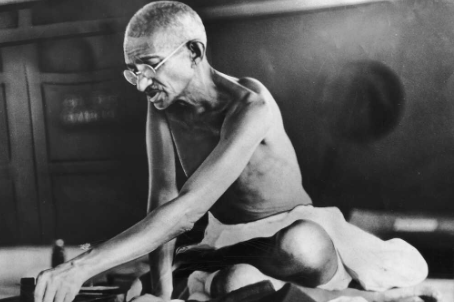"As a man
of faith, you are troubled by the
thought: what will Providence do with
Gandhi?
And what is the meaning of the
appearance of this strange person among
the statesmen and politicians of our
time?
A warning
from God. That is surely the meaning of
the leader of the great Indian nation.
Through that person, Providence is
showing politicians and the statesmen of
the world, even Christian ones, that
there are other methods in politics than
skill, wiliness and violence. Gandhi’s
political method is very simple and
obvious: he does not require anything
except the man who cries out and the God
Who hearkens.
Against weapons,
ammunition and army, Gandhi places
fasting; against skill, wiliness and
violence, prayer; and against political
quarrel, silence. How puny and pathetic
that looks in the eyes of modern men,
right?
In modern
political textbooks, these three methods
are not even mentioned in footnotes.
Fasting, prayer and silence! There is
hardly a statesman in Europe or America
who would not ironically see these three
secrets of the Indian statesmen as three
dry twigs pointed on the battlefield
against a heap of steel, lead, fire and
poison. However, Gandhi succeeds with
these three “spells” of his; he succeeds
to the astonishment of the whole world.
And whether they want to or not,
political lawmakers in England and other
countries will have to add a chapter
into their textbooks: “Fasting, Prayer
and Silence as Powerful Weapons in
Politics.” Imagine, would it not be to
the fortune of all mankind if these
methods of the unbaptized Gandhi
replaced the methods of the baptized
Machiavelli in political science?
But it is not the Indian’s method in
itself that is such a surprise to the
world, as it is the person using the
method. The method is Christian, as old
as the Christian faith, and yet new in
this day and age. The example of fasting,
prayer and silence was shown by Christ
to His Disciples. They handed it down to
the Church, along with their whole
example, and the Church hands it to the
faithful from generation to generation
until this day. Fasting is a sacrifice,
silence is inward examination of oneself,
prayer is crying out to God. Those are
the three sources of great spiritual
power which make man victorious in
battle and excellent in life. Is there a
man who cannot arm himself with these
weapons? And which crude force in this
world can defeat these weapons? Of
course, these three things do not
include all of the Christian faith, but
are only a part of its rules, its
supernatural mysteries.
Sadly, in
our time, among Christians, many of
these principles are disregarded, and
many wonder-working mysteries are
forgotten. People have started thinking
that one wins only by using steel, that
the hailing clouds are dispersed only by
cannons, that diseases are cured only by
pills, and that everything in the world
can be explained simply through
electricity. Spiritual and moral
energies are looked upon almost as
working magic.
I
think that this is the reason why ever-active
Providence has chosen Gandhi, an
unbaptized man, to serve as a warning to
the baptized, especially those
baptized people who pile up one
misfortune on another upon themselves
and their peoples by using ruthless and
harsh means.
The
Gospel also tells us that Providence
sometimes uses such warnings for the
good of the people. Your Grace will
immediately realize that I am alluding
to the Roman captain from Capernaum (Matt.
ch. 8). On the one hand, you see the
Elders of Israel who, as chosen
monotheists of the time, boasted of
their faith, meanwhile rejecting Christ,
and, on the other hand, you see the
despised Roman pagan who came to Christ
with great faith and humility, asking
Him to heal his servant. And when Jesus
heard it, He was astonished and said to
those who followed Him, “Truly I say to
you, not even in Israel have I found
faith like this.”
The
Christian world is the new, baptized
Israel. Listen! Is Christ not telling
the same words today to the consciences
of the Christian Elders by pointing to
today’s captain of India?
Peace and health from the Lord to you."
From
Missionary Letters of Saint Nikolai
Velimirovich: Letters 1-100, trans.
Hierodeacon Serafim (Baltic), Vol. VI in
A Treasury of Serbian Orthodox
Spirituality.

GHANDI
My hero is Gandhi. Gandhi was a brave
man who helped Indians get their
freedom. Gandhi also had a wife who he
married when he was thirteen; her name
was Kasterba. He had a son named
Harilal. Gandhi was born in Porbander
Gujarat on 2, October 1869. India was
under British rule at this time. He had
his school in Rajkot where his father
served as the adviser or prime minister
to the local ruler. Though India was
under British rule, over 500 kingdoms,
principalities, and states were allowed
to govern themselves. These where called
the "native states". Rajkot was one of
the states. Gandhi left for England to
study law in 1891. He failed with his
law practice. About the same time, he
got a job offer from a man named Dada
Abdullah in South Africa. Indians
weren’t treated fairly. They were called
"coolies". European racism against
Indians was horrible. Indians weren’t
considered full humans. Gandhi started
leading the Indians in. He started using
Satyagraha, which means practice of
non-violent resistance
He believed in seeking the truth on
nonviolence. He returned to India in
1915, and went to Europe for a short
trip in 1931. He helped Indians in his
travels. He became well known as an
Indian leader. A writer gave him the
title Mahatma that means "Great Soul".
He than wrote a report about the great
massacre of an unarmed crowd of Indians.
Over the next two years he tried to get
the Indians to care for themselves,
without British help. In 1922 Indian
policemen were brutally killed. Gandhi
was arrested and sentenced to six years
in jail for protesting against the
government. The trial was known as "the
great trial". In 1924, he went on a
twenty-one day fast because
Hindu-Muslims riots broke out. He got
out of jail in 1925 because of his poor
health.
Throughout his life, Gandhi stood up for
the civil rights of his people. He wrote
letters, fasted, and even was sent to
jail. For example, in 1932 he started an
ethnic fast, which he did until the rest
of his life to protest unfair treatment
of Indians. Another example of how he
protested was when he was sent to jail
for breaking the "Salt Law". Gandhi also
traveled widely to try to get the world
to understand how Indians were being
treated
Gandhi had faced many problems for what
he was standing up for. He was sent to
jail many times for what he believed. He
had poor health. He helped poor farmers.
He had many major accomplishments. He
was a civil rights leader in India and
Africa. He was nominated six times for
The Nobel Prize. He was named the person
of the year by Time Magazine. He
inspired civil rights. He fought for
freedom for India, and
practiced
nonviolence. He was a hero in many ways.
He was great leader of India. He helped
get Indians freedom and rights. He was a
brave and respectful man who cared about
every one's freedom. Gandhi was
assassinated on January 30, 1948. He was
shot by Nathuram Godse on the way to a
prayer meeting. Gandhi inspired me with
his bravery and courage.
Source: :
https://myhero.com/Gandhi_Foresthills_MS_06_ul

